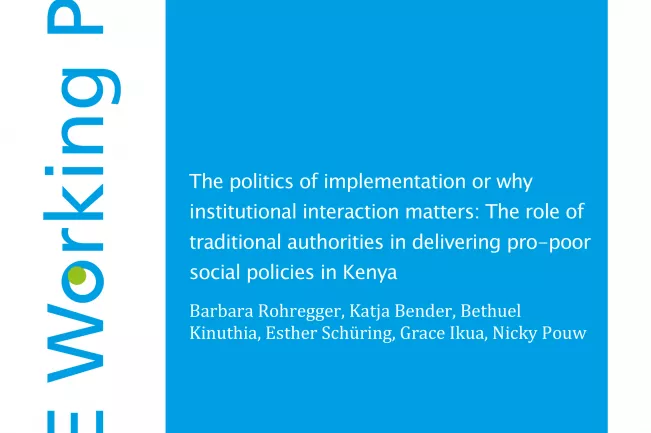International Centre for Sustainable Development (IZNE)
IZNE Working Papers Nr 18/2 and 18/3 published
Barbara Rohregger, Katja Bender, Bethuel Kinuthia, Esther Schüring, Grace Ikua, Nicky Pouw: The politics of implementation or why institutional interaction matters: The role of traditional authorities in delivering pro-poor social policies in Kenya. Hochschule Bonn-Rhein-Sieg, 2018 (IZNE Working Paper Series, 18/2.) ISBN 978-3-96043-036-0
doi:10.18418/978-3-96043-036-0

Abstract
The paper contributes to the debate on the political economy of implementation of propoor social policy. It argues for a broadening of the debate, which is dominated by technocratic arguments, emphasizing the lack of financial resources, technology or skills as the major barriers for effective implementation. Describing the dynamic interplay of ‘formal’ operational programme structures and ‘informal’ traditional institutions in delivering the CT-OVC – the largest and oldest cash transfer programme in Kenya – it argues for the need to look more closely into the local political economy as an important mediating arena for implementing social policies. Implementation is heavily contingent upon the local social, political and institutional context that influences and shapes its outcomes. These processes are highly dynamic and ambivalent evolving between ‘formal’ and ‘informal’ structures and institutions. They may change over time and place, challenging the implicit assumption that programmes are evenly implemented across geographic and political entities.
Nicky Pouw, Barbara Rohregger, Esther Schüring, Kennedy Alatinga, Bethuel Kinuthia, Katja Bender: Social Protection in Ghana and Kenya through an Inclusive Development Lens: complex effects and risks. Hochschule Bonn-Rhein-Sieg, 2018 (IZNE Working Paper Series, 18/3.) ISBN 978-3-96043-056-8 doi:10.18418/978-3-96043-056-8

Abstract
This paper analyzes the complex effects and risks of social protection programmes in Ghana and Kenya on poor people’s human wellbeing, voice and empowerment and interactions with the social protection regulatory framework and policy instruments. For this purpose, it adopts a comprehensive Inclusive Development framework to systematically explore the complex effects of cash transfers and health insurance at the individual, household and community level. The findings highlight the positive provisionary and preventive effects of social protection, but also illustrate that the poorest are still excluded and that promotive effects, in the form of enhanced productivity, manifest themselves mainly for the people who are less resource poor. They can build more effectively upon an existing asset base, capabilities, power and social relations to counter the exclusionary mechanisms of the system, address inequity concerns and offset the transaction costs of accessing and benefitting from social protection. The inclusive development framework enables to lay these complex effects and interactions bear, and points to areas that require more longitudinal and mixed methodology research.
This research was supported by funding of the NWO-WOTRO Science for Global Development Framework, through the INCLUDE knowledge platform 'Inclusive Development in Sub-Saharan Africa' research programme. The funding covered a period of two years, from April 2015-July 2017.